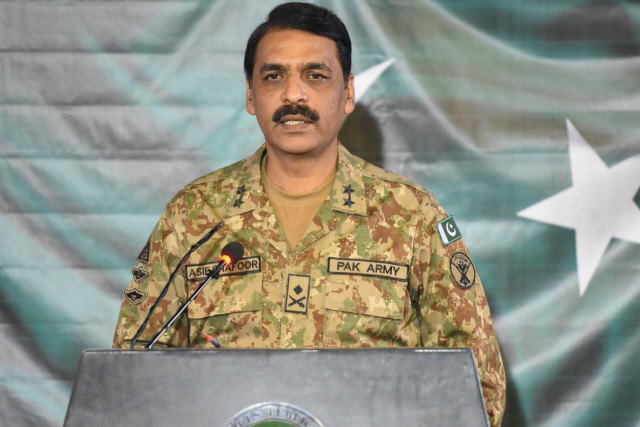Army has no voluntary role in conduct of elections: DG ISPR
Maj Gen Asif Ghafoor says the military supported government during PTI's dharna of 2014

DG ISPR Major General Asif Ghafoor. PHOTO: ISPR
In a television interview, DG ISPR Major General Asif Ghafoor also said that the Pakistan Army had supported the then democratic government during the dharna staged by the Pakistan Tehreek-e-Insaf (PTI) in 2014.
"The army had followed the government instructions at that time. The army, as an institution, had deployed troops for the security of important buildings and performed other tasks assigned by the government," the military spokesperson said. “The army follows the government’s orders.”
Imran Khan had called off his marathon dharna – from August 14 to December 17, 2014 – at Islamabad's D-Chowk after terrorists rampaged through the Army Public School in Peshawar massacring around 150 people – mostly pupils.
The military spokesperson said in another TV interview on Saturday that the Pakistan Army always supported democratically elected governments in accordance with the law and the Constitution.
"The army has been engaged in national security responsibilities, especially for the past 20 years as I’ve said earlier. Our responsibilities don’t allow us to get involved in any such [political] activity," he said while referring to the security challenges faced by the country on eastern as well as western fronts.
The corps commanders on Monday reaffirmed that the Pakistan Army would continue to support national institutions as and when asked in accordance with the Constitution. They also said that reversal of security gains would not be allowed "to suit any vested agenda at any cost".
The JUI-F chief called into question the constitutional and democratic credentials of the PTI government which he alleged had come to power as a result of a rigged election in 2018.
Maj Gen Ghafoor said the military took up electoral responsibility whenever assigned by the government. "The Pakistan Army has no voluntary role whatsoever in the conduct of elections," he added.
Army chief General Qamar Javed Bajwa also favours no involvement of the armed forces in the election process.
"The army chief has repeatedly called for devising a system in which the army's involvement in the conduct of elections is reduced to zero… we are the last one to seek any duty in elections. The army would not have any role in the election process, if governments do not call it in."
"The armed forces cannot decide deployment of troops on their own," the military spokesperson clarified. "It is the government that calls in the military in aid of the civil administration according to the Constitution for the elections."
“When the army is called in for the conduct of elections in aid of the civil administration, then it is an order and the army has to obey the order and perform the task assigned by the government,” he added.
He added that the Election Commission of Pakistan (ECP), which is responsible for the conduct of free and fair elections, was constituted by the government in consultation with opposition parties. “Similarly, the interim government and head of ECP are also appointed by the political parties.”
Maj Gen Ghafoor also revealed that the army chief had advised parliamentarians in meetings in the run-up to the 'Azadi March' to resolve all national issues amicably.
"The army chief had interacted [with MPs] twice before and on February 27 – first in the Senate and then during a parliamentary committee's briefing, where he suggested formation of a parliamentary committee which could formulate a strategy on key national issues.
The JUI-F chief had called upon the military on Friday to stop supporting the government, triggering a rejoinder from the military spokesperson who said that the Pakistan Army “is an impartial state institution which always supports democratically elected governments”.
The military spokesperson refused to comment when asked if the ‘Azadi March’ has damaged Pakistan’s image internationally, saying he would not give a political statement.
“Maulana Fazlur Rehman is a senior politician. He holds Pakistan as dear as we all do … and he is, I believe, aware of the implications [of his dharna] at the international level," he added.
The JUI-F chief had reportedly reacted to the earlier interview of the military spokesperson, saying it could be his personal opinion. Maj Gen Ghafoor, however, said he was spokesperson for the Pakistan Army and spoke for on behalf of his institution during media interactions.
"In politics, people might make a statement and then say it is their personal opinion, but I'm DG ISPR and whatever I say [during media interactions], I say it in my capacity as DG ISPR," he added.
On the Kashmir issue, Maj Gen Ghafoor said the armed forces “have been rendering sacrifices for the last 70 years”, adding that the government and the military had neither made any compromises on the issue nor would they ever think of doing so in the future.
To criticism on Kartarpur Corridor, the DG ISPR said, “The initiative has been taken by the government solely for the Sikh community in Pakistan and the world over and it has no link with the Kashmir issue.”
He clarified that Kartarpur Corridor was ‘one-way corridor’ and Sikh pilgrims would only be permitted to visit the gurdwara and won't be allowed to leave its premises while international yatrees would not be allowed to cross the Indian border.
"Taking this opportunity, I would like to clear one more point here that being part of the government and involved in security of the initiative entry for this will be a legal entry, a permit-based entry … there will be no compromise on security and sovereignty.


1724319076-0/Untitled-design-(5)1724319076-0-208x130.webp)
















COMMENTS
Comments are moderated and generally will be posted if they are on-topic and not abusive.
For more information, please see our Comments FAQ